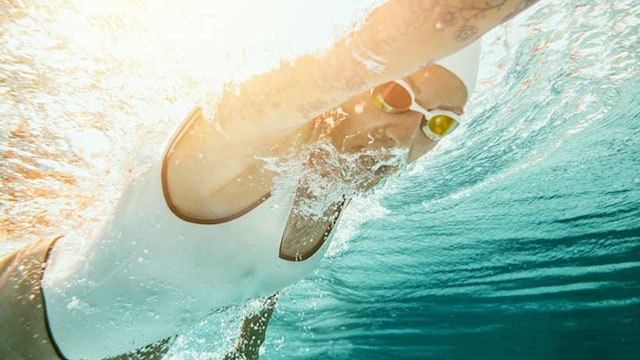Just getting in the pool and clocking up some lengths is great for general fitness and relaxation, but if you’re looking to increase your swimming endurance and improve your technique a little, there’s lots you can do to take those water workouts to the next level. Follow these five tips for superior swims this summer…
EMBED START Instagram
EMBED END Instagram 1. Work on your leg kicks
Good freestyle technique will help spread the effort from head to toe, as well as helping you swim faster. "My first tip would be to work on your leg kick on freestyle," says Olympic silver medallist Michael Jamieson. "Your leg kick's really important as it takes the stress and strain off your shoulders." How to do this? For starters, you’ll need "willpower" and a "willingness to give it a go", says Kevin Brooks, Head Coach for Wycombe District Swim Club. "Kick is one of the hardest things in any swimmer's training programme, but it will reap great rewards if you can improve it. Try to include some kicking sets in your workout using a board [float], or kicking on your back without a board.
MORE: Get more fitness tips and inspiration here
"Maintaining a good body line is essential, so if you find that your legs sink when you kick with a float, then try putting your head down, which will help to bring the legs and hips higher in the water, reducing drag."
EMBED START Instagram
EMBED END Instagram 2. Slow down and focus on your breathing
"My second tip would be to work on the rhythm of your breathing. Working on both of those things [breathing and kicks] will allow you to swim for longer," says Michael. "And it's easier as well; it doesn't sap your energy so much." Incorporating longer swims, at a lower intensity, can be a good way to get into a comfortable rhythm with your breathing, as well as being beneficial overall.
EMBED START Instagram
3. Mix up your strokes
A more varied pool workout doesn't just keep things interesting but will work different muscle groups, and help prevent fatigue and overuse injuries (though be careful with breaststroke if you have low-back problems, and avoid any strokes that aggravate existing injuries or joint issues). "Mix up freestyle, some backstroke and some breaststroke; you can even add in pull sets and kicks," suggests Kevin. "Mixing it up gives your body a greater all-over workout and will also prevent injury. Doing freestyle all the time could result in your shoulders hurting."
STORY: 5 ways to stay in shape on holiday
EMBED END Instagram
EMBED START Instagram
4. Consider having a lesson with a coach
"You can feel what you do, but you can't see it," says Kevin. "This is why it's important to get guidance from qualified coaches or teachers if you want to improve your technique." You might feel quite comfortable in the water and that your technique's OK, but if you're keen to start training a little harder, there might be little tweaks that could make a big difference. "Most swimmers, even higher-level competitive swimmers, think that to go faster they simply have to try harder. This isn't the case," adds Kevin. "To go faster and achieve more distance, it's important to reduce drag, so swimming efficiently and maximising each pull and kick is essential."
EMBED END Instagram
EMBED START Instagram
5. Warm up before you get wet
Lots of people skip the warm-up before getting into the pool, and if you're just doing a leisurely swim or aiming to relax, that's probably fine – but if you want to ramp it up and see improvements, it's worth making it part of the workout. "The best way to warm up for a swim is to do a short routine based around RMAP," says Kevin. "Raise your heart rate (skipping or jogging on the spot); Mobilise your limbs and trunk (arm swings and leg swings); Activate (put your body through a big range of movement exercises on the poolside floor), and finally Prime (maybe do some press-ups, squats or jumps). You'll then be warm and ready to start swimming. "And after swimming, always do five to 10 minutes of stretching, in order to reset your muscles and assist in recovery."
See the latest health and fitness features here. EMBED END Instagram
TRACKING START GA
TRACKING END GA
